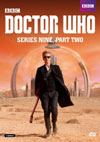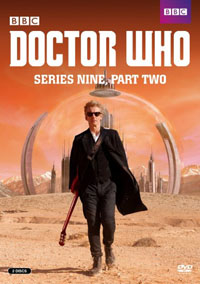DVD Extras for this story on the 14-episode box sets include:
But writer Steven Moffat, director Rachel Talalay, and star Peter Capaldi do stellar work in this one to make it all hold together with superb clarity and even to make it compelling for a good portion of the run. This is one of the more solid stories of the season, all things considered, but it still has a few significant drawbacks.
Perhaps the most puzzling thing about this entire setting is the fact that the Doctor is basically confessing the exact same things to this creature each time through the loop. If it is still satisfied to hear the same things over and over, why would anyone ever get around to confessing anything juicy or important? The fact that we can even ask that question is indication of yet another problem... The one critical thing that really wasn't explored well enough for me to go along with it was the nature of the episode's creature, and specifically its apparent invincibility. Yes, we know it's taken on the form of one of the Doctor's boyhood nightmares, but what in fact is it? Specifically, why is it taken for granted that, should the Doctor touch it and enter into a physical struggle with it, the creature automatically wins and the Doctor dies? How is it that the Doctor has available to him his sonic sunglasses and an operational teleport, and with those devices can't come up with a way of dematerializing the creature and leaving its molecules in a disembodied state? The supremacy of Moffat's often recurring half-dead creature chasing the protagonists while they run around putting clues together isn't valid as automatically as he seems to think. It's a good archetypal device, but this example feels like a bit of fluff because it never truly has an opportunity to withstand proper scrutiny during this adventure. It's quite common for creatures fulfilling this story function to get a chance to demonstrate what they can do on someone else in front of the protagonist's eyes, but today's creature can't really get any such chance because the Doctor's the only one here.
One of the great backbone strengths of this episode is its focus on the Doctor's problem-solving abilities. The episode thrives on the details of his clever solutions, the means and speed with which he comes to them, and also the emotional struggles he has to maintain his motivation and concentration. Additionally, this is being brought to the screen with all the tricks and craftsmanship that cinema can take pride in, making it a treat for the eye and the ear. One of the best devices here is the use of the TARDIS console room interior as the Doctor's virtual thinking space, in addition to Clara's blackboard scratchings to help get around the "Sprechhund" problem. This is very nicely introduced early in the episode, and used quite well later on. Many meditational techniques actually recommend that participants imagine similar safe comfortable workplaces with supercomputers providing all information at the participant's fingertips, so this does seem like a natural fit to be the Doctor's version of it all.
The Boredom FactorI think the biggest caveat of the story is just one simple small thing. Around about 25 minutes in on my first viewing, as my hopes for the appearance of a guest cast or a change of scenery collapsed and died, I noticed I was getting kind of bored by the episode. It felt like I was stuck with watching Capaldi poke around with this formula without anything truly interesting to do for the rest of the "TV hour". And I'll stand by that instinct and wonder why Rachel Talalay didn't compress this episode a little better in the editing room. As designed for a 45-minute slot, this one probably should have naturally rung in at about 42 minutes - on the shorter end of the scale. Instead, it's been overblown to a whopping 56 minutes, and I really can't think why. I don't think it deserved that.At any rate, this is an episode that can win back its audience in its final 7 or 8 minutes, even after losing them, because the magnitude of the ideas as they come together at the very end is so potent. I love the energy of the editing and sound and images in the final sequence, which I have to rate as one of the most satisfying moments of the season. Indeed, as I look back on the last three episodes of the season proper, this is really THE big victory for the Doctor right here, far larger and with more primacy than anything he accomplishes in the others. And this episode really does stand apart from the others, as a complete story on its own, with a clearly motivated goal of escape for its protagonist. The coda is of course one of the best cliffhangers of the season, once again making it very hard for any viewer to stop here and not watch the next episode straight away. But one of the big questions I have here is... How did the Doctor's confession dial get from Ashildr's pocket in present day London to the desert outside the Capitol city on Gallifrey? Granted - it's had plenty of time... And if this entire gruelling experience has been part of the confession dial the whole time, exactly what was the Doctor's participation and motivation in helping to create it and take care of it all season? Why would he not have recognized the interior for what it was sooner?
International Titles:Deutsch: "Die Angst des Doktors"Magyar: "Az örökkévalóság másodperce (2. rész)"Français: "Descente au paradis"Русский: "Ниспосланный с небес"Italiano: "Mandato dal cielo"Check out the Hungarian title for this one "The Second of Eternity". That's "second" as in 60 of them will add up to a minute. Kinda cool. All things considered that's probably the best title this episode got from any language, including English.The Germans also tried a variation: "The Fear of the Doctor". That's pretty limp - It could describe a few dozen adventures, and wouldn't do much to help me want to tune in. Most other languages attempted to be literal, so here comes the usual confusing merger of ideas like "sky", "heaven", and "paradise"....
This story is available on DVD and Blu-ray:
Comments on this article are welcome. You may contact the author from this page:
|
||||||||||||||||||||||||||||













